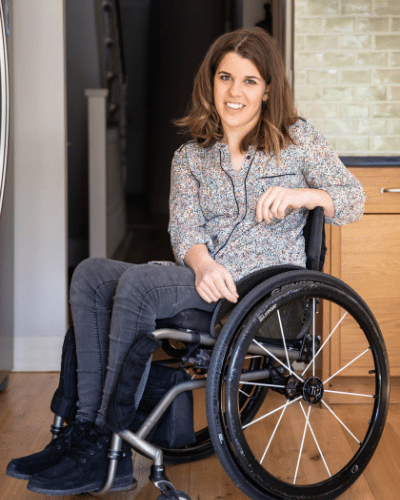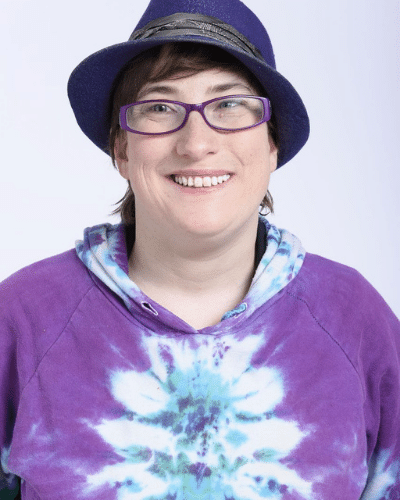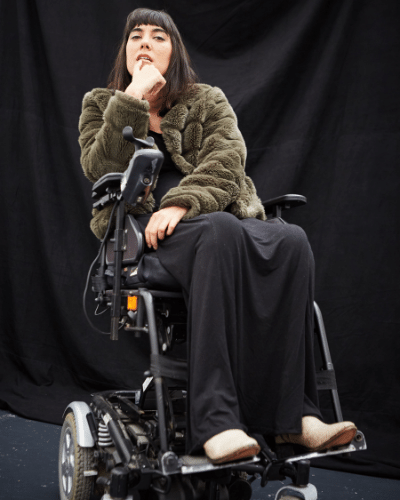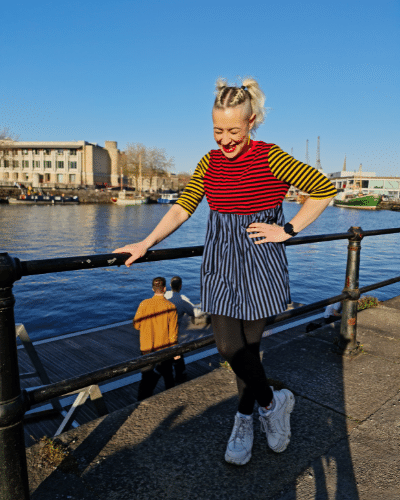Periods & Disability, Impairments and Conditions
We acknowledge that everyone’s period experience is unique, and if you have a condition or impairment this may come with it’s own menstrual challenges/ considerations. As part of our Plastic Free Periods campaign we conducted a survey on ‘Periods & Disability’ which found that two in every five Disabled people who responded are dissatisfied with the period product they use. Of those dissatisfied, 88% are using big-brand pads and 42% using big-brand tampons, both of which contain plastics and fragrance.
We don’t think this is good enough – everyone deserves to feel confident, dignified and as comfortable as possible whilst on their period!
A unanimous call for more information
There was a unanimous call for more information about periods and period products, as well as more personal stories and recommendations. To start to respond to these requests we’ve co-created a blog on using a menstrual cup when disabled, created a Period Product Guide for Additional Needs, and curated an event on Periods and Disability for Menstrual Health Day.
Our sold-out event was sponsored by our brilliant partners Natracare and hosted by the wonderful Shani Dhanda – a multi-award-winning disability specialist and entrepreneur listed as one of the UK’s most influential disabled people and BBC’s 100 Women 2020 List.
We also had four amazing panellists join and discuss their experiences of periods, sex education, shame and more:

Sophie Elwes – Athlete on the British Disabled Waterski Team and Podcast Host of ‘A Life Less Ordinary’.

Robyn Steward – Author of The Autism Friendly Guide to Periods.

Kyla Harris – a visual artist, writer and queer disability activist who explores the perspective of ‘the Other’.

Imogen Fox – Queer, Disabled, Femme discussing radical body politics.
Catch up on the panel event
Personal menstrual experiences
Periods are personal and unique to each of us, and there is potentially an even greater variety of menstrual experiences amongst the Disabled community, due to the wide range of physical, mental, cognitive, and developmental conditions and impairments. The impact of disability on menstruation inevitably affects people’s product choices and priorities when thinking about period care.
One of the key issues raised in our research and during the online event was heightened discomfort when menstruating. Several of our panellists mentioned the difficulties of getting comfortable when using certain internal products, particularly if in a bed or chair for long periods of time. In these cases, PA’s/carers might insert the product for them, but they would then be unable to manoeuvre the product if it wasn’t correctly/ comfortably inserted.
Panellists and survey-respondents with limited mobility also expressed concerns about leaks from pads that may have shifted in underwear during transfers or hoisting from a chair or bed.
Robyn, who is autistic and has cerebral-palsy down one side of her body, mentioned that the sensation of mainstream plastic pads caused sensory issues and discomfort, and all the panellists agreed that the materials of mainstream pads were irritating at times (the term “cheese grater” got thrown around a few times…!). Kyla told the group that she’s now very happy using plastic-free, organic Natracare tampons and pads.
Imogen and Kyla discussed the difficulties related to having male PAs (personal assistants) who would be less familiar with the positioning of pads in underwear or how to insert a tampon. Imogen said that they often use incontinence pants and incontinence sheets at night, as it can be easier and prevents leaks from occurring.



Shame and Stigma
The panel also discussed shame and stigma, with embarrassment starting from a young age when in school. The panellists all agreed that period education wasn’t progressive, open, or comprehensive when they were at school, describing it as very ‘clinical’. Kyla highlighted the importance of holistic education at a young age; it was only as an adult, and as a result of experiencing her period with a PA that she discovered her bleeding was much heavier than normal, and that this was due to fibroids.
“Shame was gifted to me… It felt like ‘here’s some information about periods and here’s a ton of shame to go along with it’” – Imogen Fox.
All our panellists agreed that representation of the Disabled community in the period space was virtually non-existent, which increased feelings of alienation and ‘weirdness’ around their bodies being different to their peers. Imogen highlighted that there is no such thing as a ‘perfect’ body and that they wish the education they received had been more honest about the weird things that our bodies do!
Menstrual health
As well as discussing period education and menstrual products, the panellists also chatted about hormones, with Sophie mentioning she suffers from PMT (Pre-Menstrual Tension) and Robyn from PMDD (Premenstrual dysphoric disorder). All shared a wish for more open conversations in society – with all genders – about how the hormone cycle can impact mood and mental health. Misunderstandings and knowledge gaps around menstrual health makes it incredibly difficult to get a swift diagnosis and appropriate treatment for menstrual conditions like endometriosis, fibroids, PMDD, PMT, etc.
“My PMT means that I experience real rage before my period… and for a long time I wasn’t able to explain why I was feeling like that, there was so much shame around it. It should be something that’s really embraced and spoken about more. ” – Sophie Elwes.
favourite product recommendations from our panellists

Kyla:
- Favourite period care product: Organic, plastic-free Natracare tampons.
- Disliked pads and found them uncomfortable when sitting all day – but would double up with both when periods were heavy before she got the IUD (Intrauterine contraceptive device).
- Doesn’t feel comfortable using menstrual cups with a PA.

Sophie:
- Favourite period care product: menstrual cup (after previously using tampons). She thought the cup would be difficult using a wheelchair but now she’s tried one she won’t be going back! Find out more about using a cup in a wheelchair here.
- Also uses and likes Cheeky Pants.

Imogen:
- Mostly uses menstrual cups: “I think it’s my favourite period product ever”.
- Also uses period pants and loves the brand Cheeky Pants: “I think that they’re the most cost-effective and crip-friendly period pants I’ve tried.” Imogen loves that the absorbent insert goes all the way up to the back and the front, so they’re effective if their catheter leaks.
- Finds disposable pads from big brands itchy and irritating.
- They don’t use reusable pads but their friend does and absolutely loves them. Their friend finds them cost-effective and really easy to wash.

Robyn:
- Uses a mixture of period pants and a menstrual cup.
- Recommends homemade pads by Precious Star Pads, as well as their Vlogs reviewing different products.
- Advised getting a wet bag for reusable pads which you can use to store them whilst out and about.
- Top tip: Don’t use reusable pads with poppers if you can’t move independently or have reduced sensation, as they may dig in or cause discomfort. You could contact an independent maker and ask them to use Velcro or some other material for securing the pad underneath underwear.
Period product guide for additional needs
If you’ve been inspired to try some new period products, but don’t know where to start – do not fear! We used findings from our survey and online event to create our brand new Period Product Guide for Additional Needs.
– Download our Period Product Guide for Additional Needs (PDF)
– Download the guide as a Word Document here.
– Read our blog on ‘Using a menstrual cup when Disabled’
– Natracare (sponsors of our event and pioneers of the world’s first organic and natural pads, tampons and liners) have an open Facebook group called ‘There Will Be Blood’ to chat all things periods.
We hope you find these resources useful, and please do share them and let us know if you have any feedback ([email protected]).

